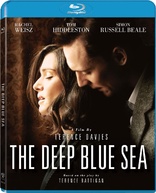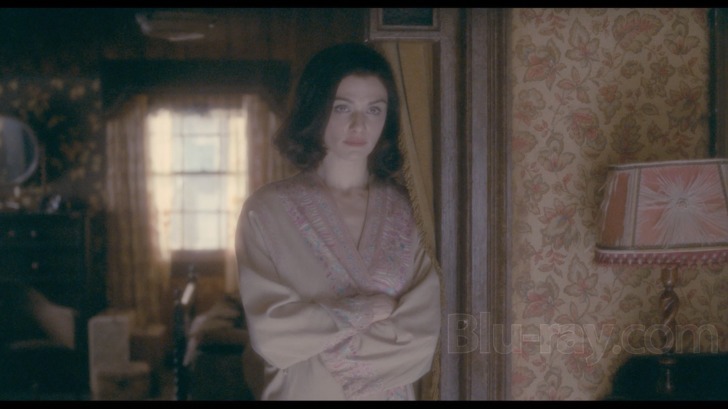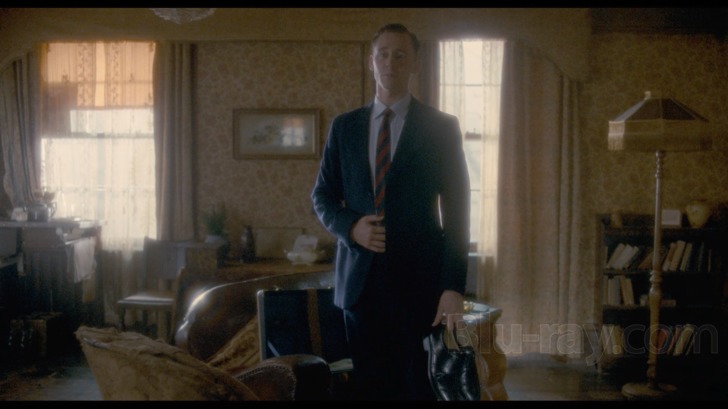The Deep Blue Sea Blu-ray Movie
HomeThe Deep Blue Sea Blu-ray Movie 
Music Box Films | 2011 | 98 min | Rated R | Jul 24, 2012
Movie rating
6.4 | / 10 |
Blu-ray rating
| Users | 3.0 | |
| Reviewer | 3.5 | |
| Overall | 3.5 |
Overview
The Deep Blue Sea (2011)
The wife of a British Judge is caught in a self-destructive love affair with a Royal Air Force pilot.
Starring: Rachel Weisz, Tom Hiddleston, Ann Mitchell, Simon Russell Beale, Karl Johnson (II)Director: Terence Davies (I)
| Drama | 100% |
| Romance | 34% |
| Period | 17% |
Specifications
Video
Video codec: MPEG-4 AVC
Video resolution: 1080p
Aspect ratio: 1.85:1
Original aspect ratio: 1.85:1
Audio
English: DTS-HD Master Audio 5.1
English: DTS-HD Master Audio 2.0
Subtitles
English
Discs
50GB Blu-ray Disc
Single disc (1 BD)
Playback
Region free
Review
Rating summary
| Movie | 3.5 | |
| Video | 4.0 | |
| Audio | 4.5 | |
| Extras | 2.5 | |
| Overall | 3.5 |
The Deep Blue Sea Blu-ray Movie Review
The Devil's in the details.
Reviewed by Jeffrey Kauffman July 24, 2012The name Terence Rattigan is probably unfamiliar to many reading this review, but for those of you who love classic films, chances are you’ve seen at least one or two film adaptations culled from Rattigan’s impressive oeuvre of stage plays. Rattigan’s The Winslow Boy was originally filmed in 1948 with Robert Donat, Sir Cedric Hardwicke and Margaret Leighton, and then was remade in 1999 in an adaptation written and directed by none other than David Mamet, and starring Nigel Hawthorne, Jeremy Northam, and Rebecca Pidgeon. Rattigan’s The Browning Version has had an even more prolific screen career, with two film adaptations (in 1951 with Michael Redgrave and in 1994 with Albert Finney) and several television adaptations. Separate Tables, Rattigan’s compendium of two one-act plays that might be half-jokingly called Not Quite So Grand Hotel, was filmed in 1958 and earned Oscars for David Niven as Best Actor and Wendy Hiller as Best Supporting Actress. Rattigan also wrote two well remembered screenplays from the mid-sixties, The V.I.P.s, which won Margaret Rutherford an Oscar for Best Supporting Actress, and The Yellow Rolls Royce, a flawed but fascinating film that utilized its titular vehicle as the bridging device between several disparate stories (in a way kind of like Winchester 73 does with its title rifle in the 1950 Anthony Mann western). Though Rattigan claimed to be writing for a middle class audience, there’s a distinctly upper class air about his plays, an atmosphere of repressed emotions and circumspect dialogue where people don’t wear their hearts on their sleeve until they’re forced to, at which point passions often burst forth in unexpected ways. Rattigan’s 1952 stage play The Deep Blue Sea is a case in point, with its story of an unhappy marriage and a brief, tempestuous fling that may remind some of Noel Coward and David Lean’s Brief Encounter, albeit with that famous British stiff upper lip somewhat more lasciviously poised. The Deep Blue Sea was first filmed in 1955 with Vivien Leigh and Kenneth More (who had been in the original stage version) in the leads, and to celebrate the centenary of Rattigan’s birth the property was revisited again in 2011 with Rachel Weisz and Tom Hiddleston. Despite current morés allowing director Terence Davies considerably more latitude in depicting both the underlying sexuality of the tale as well as some of its more depressive attributes, many may find this Sea decidedly old fashioned, which is not necessarily a bad thing.

In one of the supplements included on this Blu-ray, director Terence Davies talks about growing up in an era of so- called “women’s films”, as well as being deeply impacted by the post-World War II gloom that seemed to be part and parcel of the British experience. The Deep Blue Sea is set in this era, “around 1950” in the words of the film itself, and it in its own way recreates those women’s pictures of yore, with a somewhat slow slog through some roiling emotions that, due to that aforementioned British stiff upper lip, aren’t always communicated in a straightforward manner.
Weisz portrays Hester Collyer, an attractive young woman who is unhappily married to a man many years her elder, a High Court Judge named Sir William Collyer (Simon Russell Beale). Hester embarks on a tempestuous affair with an RAF pilot named Freddie Page (Tom Hiddleston), ultimately leaving Sir William after Sir William catches her engaging in a romantic phone call with her paramour. That, more or less, is the sum total of the basic dramatic arc of The Deep Blue Sea, but the film is structured rather interestingly. The original Rattigan play was an odd duck, with a first act given over to third person exposition before Hester’s story actually fully exploded into view. Here, Davies has reimagined the work as a trip through memory, with past and present colliding in an ever changing kaleidoscope that keeps the viewer slightly off kilter trying to “arrange” the timeline in an orderly fashion. It’s a mostly successful gambit which helps put the viewer squarely in Hester’s emotionally unsettled shoes.
Like several films culled from Rattigan plays, The Deep Blue Sea is a talky piece, although in this case the dialogue has a highly artificial, even arch, ambience that undercuts the supposed middle class ethos of at least Hester and Freddie and tips precariously close to self-parody a time or two. The dialogue better serves the upper class characters (again, as in many of Rattigan’s pieces), especially some scabrous commentary from Sir William’s mother, who warns Hester about the “ugliness” of passion and that the preferred approach for a proper British wife is “guarded enthusiasm”. It’s a fitting summation for a film that hedges its emotional bets even as it depicts a woman pushed to the edge of suicide by a life devoid of any spark of excitement, only to find that when a spark does appear, it's a fleeting entity.
The Deep Blue Sea Blu-ray Movie, Video Quality 

There are probably going to be some who see The Deep Blue Sea's AVC encoded 1080p 1.85:1 transfer, presented courtesy of Music Box Films, and will be complaining about how soft it is. And while technically they may be correct, the fact is, that look is exactly what director Terence Davies and cinematographer Florian Hoffmeister were out to achieve. The film is shot in often very dark light, with quite low contrast, giving a gauzy soft appearance to the entire film, and also bathing some backlit scenes in a sort of hazy glow. This is obviously a piece of and about memory, and the haziness is intentional. That does mean that fine detail and shadow detail are simply not as evident as they often are in sharper high definition presentations, but again, this was exactly what was wanted for the film, as Davies makes completely clear in his commentary. Colors are blanched, with very few bright primaries dotting the frame. Instead, it's the drab, cold world of post-World War II Britain, which may again make some viewers think they're watching a less than ideal presentation.
The Deep Blue Sea Blu-ray Movie, Audio Quality 

The Deep Blue Sea has two lossless DTS-HD Master Audio tracks, a 5.1 surround mix and a 2.0 stereo fold down. The soundtrack is probably most notable for its use of some gorgeous Samuel Barbur music. In fact, Davies seems to be emulating Michael Powell's famous dictum of "composed cinema", for he crafts the entire first sequence of The Deep Blue Sea around the slow movement of Barbur's Violin Concerto, to differing results. Barbur's first plangent horn statement works brilliantly with the realization that Hester is committing suicide, but some of the overarching declamations from the violin seem slightly at odds with the tamped down emotional life of Sir William especially. All of this said, the 5.1 mix presents the music stupendously well, and for such an otherwise "quiet" little film, there are some very smart uses of channelization in terms of ambient environmental effects. Fidelity is excellent and dynamic range is rather nuanced and surprisingly wide for this type of film.
The Deep Blue Sea Blu-ray Movie, Special Features and Extras 

- Audio Commentary by Terence Davies actually also features Ian Hayden-Smith, and the two offer a nicely erudite, articulate commentary that gets into everything from the title design to sound design to framing certain shots, acting style and Rattigan's original play. It's wonderful to hear Davies speak so lovingly of Samuel Barber's music, which he utilizes in the film.
- Interview With Rachel Weisz (SD; 5:51) has Weisz discussing the character of Hester.
- Interview With Tom Hiddleston (SD; 7:28). Hiddleston discusses the conflict of someone caught in a loveless marriage and what deciding to have an affair means.
- Terence Davies' Master Class (HD; 27:35) is a sort of Q&A with Davies. He does discuss several of the film adaptations of Rattigan's plays and how he came to adapt the play to film as well as the casting and filming processes.
- Realizing the Director's Vision (SD; 11:16) features Producer Kate Ogborn, Cinematographer Florian Hoffmeister, Production Designer James Merifield and Davies himself discussion how they brought Davies' vision to the screen.
- Original Theatrical Trailer (HD; 1:18)
The Deep Blue Sea Blu-ray Movie, Overall Score and Recommendation 

The Deep Blue Sea is a kind of strangely cold film, especially odd since it deals with a woman trying to connect with her own sexuality and passion. Weisz and the two men are brilliant together, but the film is rather loosely tethered to the original Rattigan play, and despite Davies having very good reasons for structuring the film as he did, he may have removed some of its visceral force with his decision. The film is elegant, beautiful to watch, but emotionally distant, rather like the marriage of Hester and Sir William. Those who like their drawing room dramas full of long, tortured glances and a roiling emotional subtext will probably find a lot to like here, but this isn't a film to really fall in love with—it's a film to appreciate, even admire, from a distance.
Similar titles
Similar titles you might also like

The Red Shoes 4K
1948

The Master
2012

Waves
2019

Phantom Thread
2017

Sunday Bloody Sunday
1971

Disobedience
2017

Bright Star
2009

Brooklyn
2015

Rules Don't Apply
2016

The Life and Death of Colonel Blimp
1943

The Souvenir
2019

The Edge of Love
2008

The Age of Innocence
1993

Carol
2015

The Piano 4K
1993

Days of Heaven 4K
1978

Incendiary
2008

Allied
2016

Mrs. Miniver
1942

The Last Picture Show 4K
includes Texasville on Blu-ray
1971